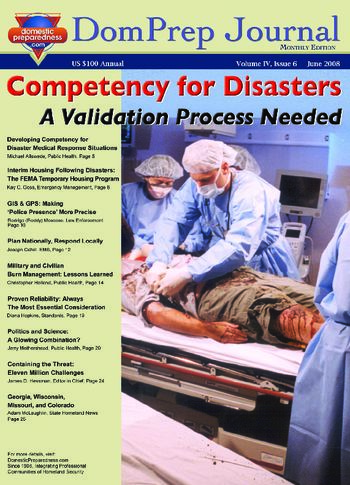

Politics and Science: A Glowing Combination?
Jerry Mothershead
June 25, 2008
How does a democracy work? Not always quite the way it should, particularly when substantive evidence has been presented for only one side of an issue and the media compensates by giving more, and more favorable, publicity to the other side.

Proven Reliability: Always the Most Essential Consideration
Diana Hopkins
June 25, 2008
Those responsible for buying emergency-response products such as instruments and devices can be easily overwhelmed by the huge number of choices available. For that reason, it is important that purchasing

Containing the Threat: Eleven Million Challenges
James D. Hessman
June 25, 2008
CBP falls short in its efforts to start implementing the “100-percent screening” mandate issued by
Congress. The issues involved are numerous, costly, and extremely complicated. Nonetheless, failure is
not an option.

Military and Civilian Burn Management: Lessons Learned
Christopher Holland
June 18, 2008
The U.S. military and civilian medical communities mingle, mix, and learn from one another, particularly in the highly specialized, but extremely important, field of burn care.

Interim Housing Following Disasters: The FEMA Temporary Housing Program
Kay C. Goss
June 18, 2008
After presidentially declared disasters, the Federal Emergency Management Agency (FEMA) offers Direct Assistance – in the form of campers, trailers, and mobile homes – to those who are without shelter.

NIMS Training Plans: An Effort Without End
Stephen Grainer
June 16, 2008
From George Washington’s days to the present, U.S. leaders have adhered to the credo that “Eternal Vigilance” is “the price of freedom.” Today, those wise words of warning are applicable,

Plan Nationally, Respond Locally
Joseph Cahill
June 11, 2008
Flexibility, common sense, and operational efficiency are the hallmarks of the new National Response Framework, which builds on the solid but sometimes too rigid foundation of its predecessor doctrine, the National Response Plan.

Developing Competency for Disaster Medical Response Situations
Michael Allswede
June 4, 2008
The treatment of victims of mass-casualty incidents is probably the greatest challenge facing the U.S. medical community – but, in most of the nation’s medical schools, ranks lowest on the academic priority list.

